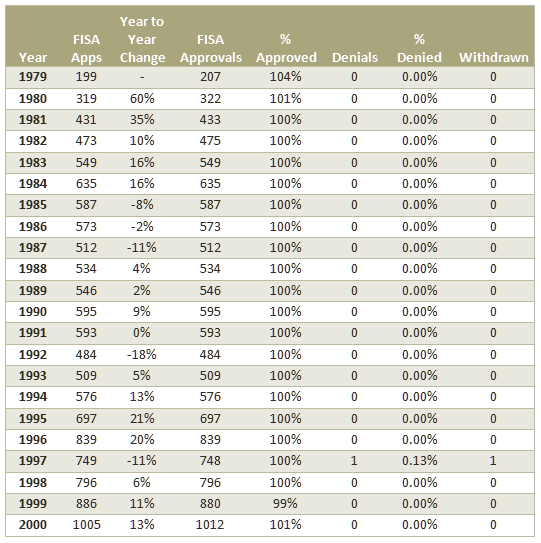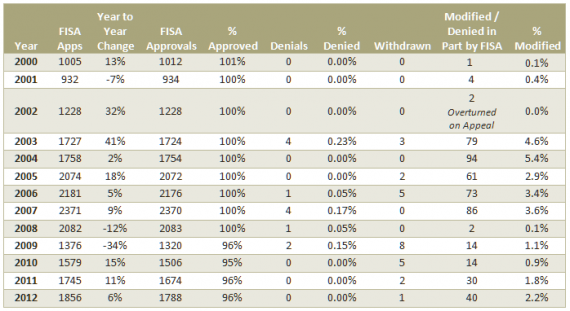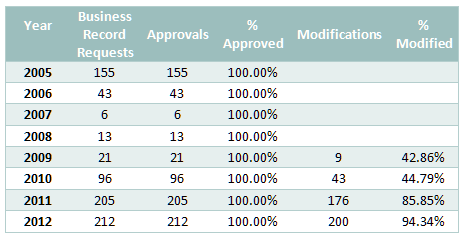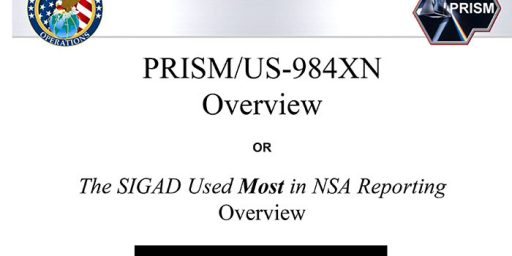Charting 33 Years’ of FISA Reports to Congress
Exploring data from 33 years' of FISA reports to Congress
Update 6.13.2013: This morning NPR’s Morning Edition program had a particularly good primer report on FISA and the issue of “rubber stamping” — I recommend it as it provides some excellent context for the numbers discussed below.
On their website, the Federation of American Scientists provide an archive of the US Attorney General’s Annual FISA Report to Congress. The reports, dating back to 1979, offer valuable information about the volume of cases that have passed through the FISA courts. I have taken all of the major data in these reports and placed it in a Google Spreadsheet (note, I’ve enabled public commenting on the spreadsheet in case anyone wishes to publicly flag any of the data).
Below you’ll find the most pertinent data from that spreadsheet broken out with some initial analysis.
FISA Surveillance Requests
FISA Surveillance Requests (1979 – 2000)  (Often, applications sumbitted in late December are approved in the new year.
(Often, applications sumbitted in late December are approved in the new year.
This leads to certain years having a 100+% approval rate)
The extremely high approval rate during this time period is immediately apparent. 1999 is the only year where there was not a 100% success rate, and in that case, five applications were submitted in late December and a sixth application was held up in the review process. All six of the outstanding 1999 applications were approved in the first quarter of 2000. In 21 years, only a single application, in 1997, was denied (the government chose to withdraw that application rather than amending it).
The year 2000 is notable for two reasons. It was the first year in which the number of FISA applications past 1000. It also marked the first year in which the FISA court chose to modify an application. While we do not know the specifics of modifications, the reports to Congress suggest that “modify” can mean a partial rejection or a limiting of the scope of the warrant. As the next chart shows, since 2000 the court continued to occasionally modify applications.
FISA Surveillance Requests (2000 – 2012)
From 2000 to 2012, we find that the FISA court denied 12 applications out of 21,914, and modified another 2% or 498 (note that in 2002, the FISA modifications were later overturned on appeal) applications. We also see that the government withdrew a total of 26 applications.
What is exceedingly clear from these numbers is that, in the vast majority of cases, FISA approves physical search and electronic surveillance applications with no changes. Looking at these numbers, it’s hard not to see the courts as something of a “rubber stamp.”
FISA Business Record Requests
The FISA courts deal with more than just applications for individual surveillance. Starting in 2005, the Attorney General was also required to report on FISA applications for Business Records. Assistant Attorney General William E. Moschella’s 2005 report included the following explanation about these requests:
In his April 4, 2005 testimony before the Senate Judiciary Committee, Attorney General Gonzales noted that the Justice Department was increasingly using business records orders to obtain subscriber information, such as names and addresses, for telephone numbers captured through court-ordered pen register or trap and trace devices. This information is routinely obtained in criminal investigations. The use of business records requests in conjunction with pen register applications accounts for much of the increase in the number of business records orders reported here as compared to statistics previously made public. Section 128 of the USA PATRIOT Improvement and Reauthorization Act specifically amended the pen register provisions of the FISA statute (50 U.S.C. � 1842) to authorize the disclosure of subscriber information in connection with such court-authorized collection. We expect that this new provision will result in a decrease in the number of requests for business records orders that are reported in the future. [Emphasis Mine — MB.]
FISA Business Records Requests (2005 – 2012)
Two things to note here:
First, despite the William Moschella’s predictions, we see that in recent years, the number of these requests have significantly grown, not decreased.
Second, while the FISA courts have approved 100% of the applications, we find a far greater amount of push-back and modification than we did in the surveillance applications. In part this may be because these are requests for far larger amounts of data.
US Person’s Information Requests
Thanks to provisions in 2005’s USA PATRIOT Improvement and Reauthorization Act, the Justice Department also began to include information about requests for information about US citizens in the annual FISA Reports. These are requests made by the FBI to National Security Letter authorities. According to the Electronic Privacy Information Center, these are applications for
an extraordinary search procedure which gives the FBI the power to compel the disclosure of customer records held by banks, telephone companies, Internet Service Providers, and others. These entities are prohibited, or “gagged,” from telling anyone about their receipt of the NSL, which makes oversight difficult. [source]
 The reports reveal that the numbers given from 2005 to 2008 are “good-faith” estimates as there was no unified system in place for tracking NSL requests. A robust tracking system for this data only came online in 2009.
The reports reveal that the numbers given from 2005 to 2008 are “good-faith” estimates as there was no unified system in place for tracking NSL requests. A robust tracking system for this data only came online in 2009.
It’s also worth nothing that for two years, 2007 and 2008, that the Justice Department released information about the number of corrective requests. The requests are sought in cases where the government discovered that they pulled information for the wrong “John Smith.” There is apparently no requirement for correction information to be reported. However, given that the 2008 numbers suggest that in 1/5 of cases the FBI pulled info for the wrong person, it would be nice to know if things have gotten better or worse.






Or maybe the warrants are carefully drawn in order to comply with the law. Or maybe the warrants are originally denied, then redrafted and successfully re-submitted.
I’m betting that in federal courts, MOST warrant requests are eventually granted-with no indication that the courts are “rubber stamping” those requests.
@stonetools:
That is entirely a possibility. I suspect that most of these requests are made with a certain amount of proven boiler plate text which speeds things through the process.
Still, a 2% denial/modification rate for the last 12 years seems especially good. However I agree that without other statistics to compare it to, we can’t be certain of that.
No. My understanding is that every pushback is reported. The reports are pretty specific that denials and modification orders always give the government the opportunity to append and resubmit. If a request is denied and successfully resubmitted its still listed as a denial. (See the 1997 report for an example of how this is handled — http://www.fas.org/irp/agency/doj/fisa/1997rept.html)
@stonetools: I think you’ve got the “why” down pretty well. I’ve commented on this before, but I’ll do so again: I know people who obtain FISA warrants and the process takes months (I was told 6-9 months) and the supporting documentation can run hundreds of pages.
I’d say the high approval rate is due to the submitters ensuring they get it right the first time, because if they don’t, they may have to wait a while.
@Mikey:
Given data in the reports, I question whether or not every application “takes months.” As I mentioned in 1999 the report clearly states that five of the hold over applications were filed in late December and approved in early January of 2000.
I’m sure that some requests take months, but it seems like others move rather quickly.
Any thought’s on the higher degree of modifications when it comes to Business Records? Could the fact that requests are wider reaching be the source of the significantly higher amount of FISA pushback?
@Matt Bernius: I’m sorry, I wasn’t clear–I meant the whole process of doing the application, submitting, having the judge go through it, etc. The actual time at the FISA court is less. And of course there’s an expedite process for time-sensitive targets. But what it comes down to is the submitters don’t want to work up an application for five months and get it kicked back. Plus, they know what they’re doing–it’s not just any Joe Field Agent who submits these things.
Don’t really know about Business Records, unfortunately.
Apparently Snowden has gone full defector. He gave an interview to a pro-Beijing paper where he ties his not being deported to exposing U.S. cyber operations on the Chinese, and he gave them their first taste, making a number of claims:
http://www.scmp.com/news/hong-kong/article/1259508/edward-snowden-us-government-has-been-hacking-hong-kong-and-china
@Jeremy R:
This guy just went from “needs to be in prison” to “needs to have a needle in his arm” IMO.
I’m not surprised by the acceptance rate, the judges only have reason and the information selected for them by the government to review under a fairly minimal standard:
In other words, FISA only requires a suspicion of a relationship, not any particular wrongful act or participation in elements of a crime.
@HarvardLaw92: What an unbelievable ego he’s got. Full-blown narcissist. “I”M SAVING THE WOOOORRRRLLLLLD!”
@PD Shaw:
PD – foreign nationals enjoy no protections under our Constitution. The standards are appropriate.
@HarvardLaw92: I don’t necessarily agree that foreign nationals enjoy no protections under our Constitution (for one thing even Khalid Sheikh Mohammed has the right to the Writ), but I didn’t mean to suggest the standards were inappropriate, but they are not very onerous. They are what they are.
(I also doubt that Congress could raise the standard since doing so would interfere with the President’s inherent constitutional authority to conduct foreign intelligence surveillance.)
@PD Shaw:
Foreign national means “a person located on foreign territory who is not a US citizen”
US national means “A US citizen, wherever situated, or a non-citizen subject to the jurisdiction of the US”
If they are here, or in US custody, obviously they enjoy constitutional protections. If they are there, it’s open season / do as you please.
@HarvardLaw92: Why don’t you suit up and take him out, Internet Tough Guy.
@Ben Wolf:
No, I follow the law. Trial. Conviction. Needle.
Surely you aren’t going to tell me that you support what he’s doing now? I could see maybe, maybe see you supporting his initial release, but are you actually going to tell me that you support him telling China how we spy on them?
If so, I’d suggest joining him in China.